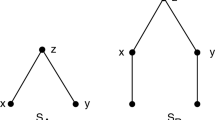
Overview
- Provides a concise overview of the current debate on physical unknowables
- Discusses how to generate a "truly" irreducibly random number
- Considers the various counterarguments against claims of absolute physical randomness
Part of the book series: Fundamental Theories of Physics (FTPH, volume 192)
Buy print copy
Tax calculation will be finalised at checkout
About this book
This open access book addresses the physical phenomenon of events that seem to occur spontaneously and without any known cause. These are to be contrasted with events that happen in a (pre-)determined, predictable, lawful, and causal way.
All our knowledge is based on self-reflexive theorizing, as well as on operational means of empirical perception. Some of the questions that arise are the following: are these limitations reflected by our models? Under what circumstances does chance kick in? Is chance in physics merely epistemic? In other words, do we simply not know enough, or use too crude levels of description for our predictions? Or are certain events "truly", that is, irreducibly, random?
The book tries to answer some of these questions by introducing intrinsic, embedded observers and provable unknowns; that is, observables and procedures which are certified (relative to the assumptions) to be unknowable or undoable. A (somewhat iconoclastic) review of quantum mechanics is presented which is inspired by quantum logic. Postulated quantum (un-)knowables are reviewed. More exotic unknowns originate in the assumption of classical continua, and in finite automata and generalized urn models, which mimic complementarity and yet maintain value definiteness. Traditional conceptions of free will, miracles and dualistic interfaces are based on gaps in an otherwise deterministic universe.
Similar content being viewed by others
Keywords
Table of contents (22 chapters)
-
Front Matter
-
Embedded Observers, Reflexive Perception and Representation
-
Front Matter
-
-
Quantum Unknowns
-
Front Matter
-
-
Exotic Unknowns
-
Front Matter
-
Authors and Affiliations
About the author
Karl Svozil studied theoretical physics in Vienna and Heidelberg, and has been visiting many institutions world-wide; including the University of California at Berkeley and the Lomonosov University. He works at the Institute for Theoretical Physics of the Vienna University of Technology and holds an honorary position at the Department of Computer Science of The University of Auckland, reflecting his interest in physical aspects of theoretical computer science. He has been president of the International Quantum Structure Association, and has served on various scientific committees, among them the FWO panel for Interdisciplinary research.
Bibliographic Information
Book Title: Physical (A)Causality
Book Subtitle: Determinism, Randomness and Uncaused Events
Authors: Karl Svozil
Series Title: Fundamental Theories of Physics
DOI: https://doi.org/10.1007/978-3-319-70815-7
Publisher: Springer Cham
eBook Packages: Physics and Astronomy, Physics and Astronomy (R0)
Copyright Information: The Editor(s) (if applicable) and The Author(s) 2018
Hardcover ISBN: 978-3-319-70814-0Published: 22 February 2018
Softcover ISBN: 978-3-319-88995-5Published: 06 June 2019
eBook ISBN: 978-3-319-70815-7Published: 13 February 2018
Series ISSN: 0168-1222
Series E-ISSN: 2365-6425
Edition Number: 1
Number of Pages: XIV, 219
Number of Illustrations: 8 b/w illustrations, 24 illustrations in colour
Topics: History and Philosophical Foundations of Physics, Theoretical, Mathematical and Computational Physics, Epistemology, Probability Theory and Stochastic Processes, Philosophy of Science



